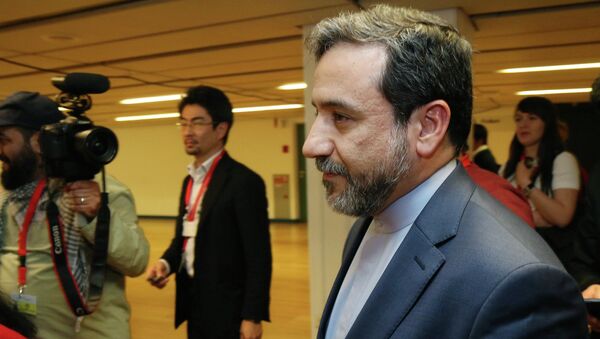VIENNA (Sputnik), Anastasia Levchenko — Vienna has been in the spotlight in the recent days, as foreign ministers of France, Germany, Britain, the United States and Iran, as well as chief of the EU foreign policy met in Palais Coburg to nail down the remaining differences for the deal to guarantee exclusively peaceful nature of Tehran's nuclear program.
After holding a number of meetings, almost all the foreign ministers left Austria's capital to convene again when the deal is almost ready. Russian foreign minister is also expected to arrive in the beginning of the next week.
So far, France and UK foreign ministers have appeared to have least flexible position, while EU foreign policy chief and German foreign minister expressed optimism about reaching the agreement in a few days after the June 30 deadline.
On Saturday, French Foreign Minister Laurent Fabius outlined the three conditions for Iran deal, including the ones that Iran refuses to accept. Particularly, Fabius claimed the deal must envision the verification of all nuclear sites, including military, as well as an automatic return of sanctions in case of the violation of obligations.
UK Foreign Secretary Philip Hammond also did not express much optimism, saying upon arrival on Sunday that "no deal is better than a bad deal."
"There are a number of different areas where we still have major differences."
Chinese Vice Foreign Minister Li Baodong, representing his country instead of the foreign minister for undisclosed reasons, just emphasized the importance of the current political process. It is "a critical time, it is a critical meeting," he said upon arrival.
EU foreign policy chief Federica Mogherini, who appeared before journalists more often than her counterparts, repeatedly claimed the deal would be reached in the coming days in the format agreed upon earlier in Lausanne.
"We are not renegotiating things that were said in Switzerland in April," Mogherini said, adding that states are now just focusing on translating the Lausanne agreements into the final text.
Germany Foreign Minister Frank-Walter Steinmeier repeated this idea in his statement to the press, saying that the main task of the negotiators now is to work out the final text.
"If there is no bad weather we will find a solution to this decades-old conflict," Steinmeier concluded.
With the devil being in details, designing the final text of the agreement is unlikely to be an easy task for the negotiators.
Next week, heads of P5+1 foreign ministries are expected to gather again, when the text of the agreement is already finalized.




